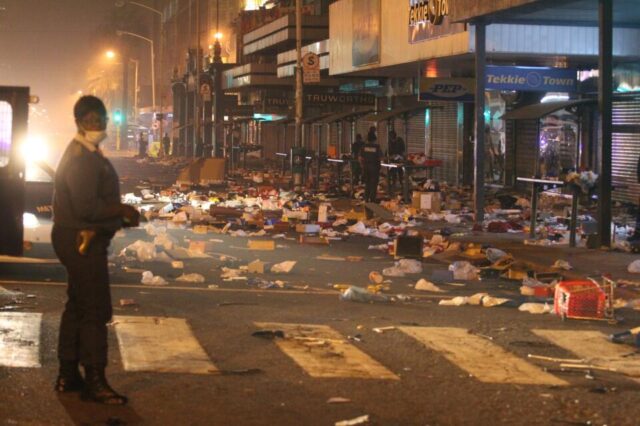The 65 people labelled as the “instigators” of the civil unrest that broke out mainly in KZN and in parts of Gauteng in July 2021 are likely to have terrorism added to the list of charges they already face when their matter reconvenes in November.
THE 65 people labelled as the “instigators” of the civil unrest that broke out mainly in KwaZulu-Natal and in parts of Gauteng in July 2021 are likely to have terrorism added to the list of charges they already face when their matter reconvenes in November.
The case is being heard at the Durban Regional Court and the National Prosecuting Authority’s Organised Crime unit is awaiting approval from the entity’s head, Shamilla Bathoi, to pursue terrorism charges.
The prosecutorial team claimed that the accused, who were allegedly responsible for rallying and marshalling the looters and others that left a trail of destruction, mainly between July 9 to 18, committed economic sabotage.
Over the days of wanton violence and plunder, shopping malls and various business premises were targeted and buildings and vehicles were burnt and destroyed, including infrastructure.
In some quarters, the acts of violence were likened to “scorched-earth” practices, which has military resonance, where the enemy is left with no rehabilitation prospects.
Three-hundred-and-fifty-four people killed, crippled businesses, thousands of jobs lost, unnecessary State expenditure and a staggering amount of insurance claims related to the multibillion-rand worth of damages, were some of the lasting effects.
The Organised Crime unit claimed that the instigators were the ones responsible for ultimately bringing KZN to standstill. Therefore, the terrorism charge was justified.
It is alleged that the accused used mainly WhatsApp groups to disseminate information to “ground forces”.
They face charges of public violence, incitement to commit public violence and conspiracy to commit public violence
Mthunzi Mhaga, the NPA’s spokesperson, confirmed the matter will reconvene later this year.
Regarding murder charges that emanated from the violence, Mhaga said advocates from their Director Public Prosecutions had guided investigations.
“A total of six dockets were enrolled thus far, three of which were with the high court and have not yet been finalised for various reasons,” said Mhaga.
Some of the murder investigations are linked to the more than 30 deaths recorded in Phoenix, north of Durban, where racial tensions between Indians and Africans flared up.
There were allegations that some Phoenix residents set up barricades in various parts to block looters, and certain patrollers targeted and maliciously attacked Africans, which also resulted in some revenge attacks.
In a related matter, the brothers Dylan and Ned Govender were found not guilty of the murder of 19-year-old Mondli Majola in May this year, but were convicted on an assault with intent to cause grievous bodily harm charge.
They were part of a mob that attacked Majola and were due to be sentenced at the Durban High Court this week, but the matter was postponed to August.
Mhaga said the slew of housebreaking, theft, and malicious injury to property cases stemming from violence were handled by district or regional courts.
The NPA’s “Durban Cluster” has handled various related matters, some of which were finalised.
During a think-tank session hosted by the University of KwaZulu-Natal previously, which brought together various experts, advocate Roshiela Benimadho, the NPA’s senior public prosecutor, attached to the Durban cluster, made various submissions.
Having done site inspections and with matters her team handled, Benimadho said some of the common threads they found included certain individuals who were involved in planning and inciting violence.
The break-ins occurred usually late at night or in the early hours to make detection difficult and CCTV cameras and DVR storage devices were taken or damaged in most instances.
Pre-arranged transport was available for looters because some targeted premises could only be accessed by vehicle and, through reconnaissance, it was established that specific vehicles were needed and arranged to cart goods.
Based on matters they handled, Benimadho debunked notions that the looters were poor people, but included the rich.
For a basket of goodies, which he carried away in his Mercedes Benz, Mbuso Moloi, who has since been dubbed the “Woolies looter”, pleaded guilty to a theft charge as his offence was caught on camera and widely circulated on social media platforms.
A forfeiture order for Moloi’s car worth R500,000 was granted to the NPA’s forfeiture unit because it was used as an instrument of crime.
He is due to be sentenced this month.
Former councillor Mpumelelo Romeo Zuma was driving in his Hyundai H1 during curfew hours at the time and frozen packages of cow hooves and chicken were found in his vehicle when police searched his vehicle.
For the various charges against him, Zuma received a 10-year prison sentence and Sthembiso Hlongwa, his passenger, was fined R10,000.
Msizi Sithole and Nkosikhona Maphumulo will have to answer why they were allegedly found in a Jeep with items like a washing machine, fan, deluxe yoga mat and a BMX bike, when their trial begins in December.








